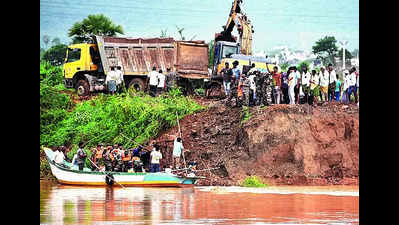
Vijayawada: Indian Army’s engineering wing taskforce have swung into action to plug the breaches in Budameru to prevent flood water from flowing into the city. The state water resources department’s engineering officials managed to successfully block two breaches by working tirelessly over the last three days.
However, the team encountered difficulties in arresting another breach on the rivulet’s long stretch, prompting the state govt to enlist the expertise of Indian Army’s engineering wing, which deployed its taskforce following a request made by chief minister N Chandrababu Naidu.
Sources said the loose soil in Budameru area caused troubles for local officials in handling the breaches. “The bund of the rivulet was completely crippled, making it particularly challenging to block due to the heavy flow of water from the upstream.
The machine drivers, who were not fully trained to handle such situations, could not move ahead against the stream to fill the breach with additional soil and sandbags,” admitted a senior official.
Considering the army’s expertise in handling significant natural calamities, particularly in the north-eastern states, the state govt sent an SOS to the Union defence ministry, which deputed the taskforce. The works have gained momentum at the breach site after the arrival of the army engineers.
A defence ministry spokesperson said the operations column of army’s humanitarian assistance and disaster relief (HADR) wing has been proactively addressing the situation in Vijayawada following breaches at three critical locations.
The initial breaches, identified as breach 1 and breach 2, each ranging from 10 to 15 metres in width, have been temporarily plugged by the civil administration, momentarily stabilizing the situation.
However, the temporary solution led to a funnelling effect, significantly increasing water flow at the third breach site, which spans approximately 80 to 100 metres. The water current at this location is currently between 6 to 8 knots, with projections suggesting it might escalate to 10-12 knots.
We also published the following articles recently
Vijayawada faces severe flooding after two decades due to incessant rains and encroachments on rivers and lakes. Rapid urban development has compromised flood defenses, leaving the city vulnerable. Despite past efforts to manage floodwaters, inadequate infrastructure and local politics have exacerbated the situation, putting Vijayawada at continued risk of flooding.
In Satna town, the embankment of Narayan pond broke on Tuesday afternoon, causing water to flood nearby areas. The administration quickly intervened and blocked the leakage within an hour, rescuing a few trapped individuals. A loss assessment survey has been ordered to compensate residents for damaged belongings.
India’s July-August rainfall has been declining over the past three decades, averaging just 530.2mm compared to higher averages in previous periods. This disrupts the expected cyclical nature of monsoons. Experts suggest climate change may be impacting regional rainfall patterns, particularly in areas like Uttar Pradesh-Jharkhand and Kerala.






